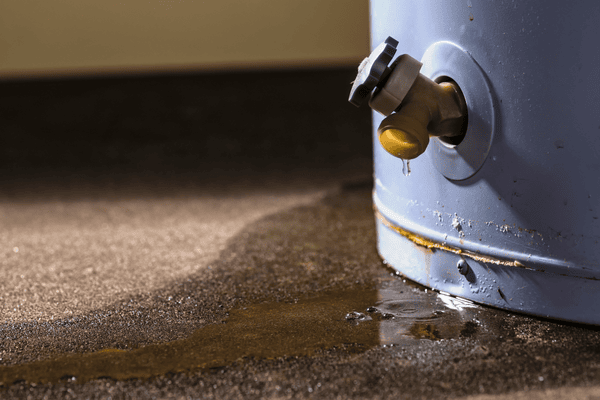Imagine waking up to a flooded laundry room or stepping into your basement only to find water pooling around your water heater. A small, unnoticed water heater leak can turn into a disaster overnight, causing damage to flooring, drywall, insulation, and even electrical components. Left unchecked, this kind of water damage can lead to mold growth, structural issues, and skyrocketing repair costs.
But how can you prevent this from happening? What are the early warning signs of a leak? Will homeowners insurance cover the damage? And most importantly, how can you minimize the cost of repairs?
This guide will answer these critical questions and give you the steps to protect your home, your finances, and your peace of mind.
How to Spot Early Signs of Water Heater Leaks
Catching a leak early can mean the difference between a simple fix and a full-scale restoration project. Even a small drip can escalate into a serious problem if left unaddressed. Here’s what to watch for:
- Puddles or Moisture Around the Base – Even a minor puddle can signal trouble. If the area around your water heater is consistently damp, a slow leak may be developing.
- Unusual Noises from the Tank – Popping, rumbling, or banging sounds suggest sediment buildup, which can cause overheating and eventual failure.
- Rust or Corrosion on the Tank or Valves – If you notice corrosion, especially near seams, valves, or pipe connections, it’s a red flag that a leak may be imminent.
- Fluctuating Water Temperature or Pressure – Inconsistent hot water flow can indicate pressure issues, a failing heating element, or sediment interfering with efficiency.
- Higher Utility Bills – A water heater that runs inefficiently uses more energy to maintain temperature, leading to increased energy costs.
Simple Ways to Confirm a Leak:
- Place a dry paper towel or cloth around suspected leak areas overnight.
- Check the temperature and pressure relief valve for drips or excessive moisture.
- Inspect the bottom of the tank for hidden cracks or rust spots.
The sooner you identify these signs, the more money you’ll save in repairs.
The Real Cost of Ignoring a Leaky Water Heater

A neglected water heater leak can lead to extensive damage and costly repairs. Here’s what you could be facing:
Structural Damage ($3,000–$10,000+)
- Leaking water can weaken floorboards, drywall, and ceilings, requiring expensive repairs.
- In severe cases, support beams and foundations may be compromised, leading to even greater structural risks.
Mold & Health Risks ($500–$6,000 in Remediation Costs)
- Mold thrives in damp environments, and standing water from a slow leak can create the perfect breeding ground.
- Mold exposure can cause respiratory issues, allergies, and long-term health concerns, especially in children and older adults.
Skyrocketing Utility Bills ($20–$50 per Month in Extra Costs)
- A failing heater struggles to maintain efficiency, leading to higher gas or electric bills.
- Older tanks with sediment buildup require more energy to heat water, making them costlier to operate.
Proactive maintenance and quick repairs can prevent these unnecessary expenses.
Does Homeowners Insurance Cover Water Heater Leaks?
Most homeowners insurance policies cover sudden and accidental leaks, including:
- A tank that unexpectedly bursts due to high pressure.
- Water damage that occurs rapidly, rather than over months of slow leaking.
- Secondary damage to flooring, drywall, and furniture from a covered event.
When Does Insurance NOT Cover Water Heater Leaks?
Insurance typically does not cover damage caused by neglect, age, or wear and tear.
- If your heater leaks due to lack of maintenance, corrosion, or a slow, unaddressed drip, insurance may deny your claim.
- If the water heater is beyond its lifespan, insurers might argue that replacement should have occurred earlier.
How to Ensure a Successful Insurance Claim:
- Document the damage immediately – Take clear photos and videos showing the affected areas.
- Keep records of maintenance – Proof of annual inspections and servicing can help prove the issue was not due to neglect.
- Work with professionals – CK Restoration can assess the damage, provide estimates, and assist with the claims process to increase your chances of getting coverage.
Quick Steps to Minimize Water Damage from a Leaky Water Heater
If you discover a leak, acting immediately can save thousands in repair costs. Follow these steps:
- Shut Off the Water Supply – Locate the cold-water shut-off valve near your heater and turn it off to prevent further leakage.
- Turn Off Power –
- For electric heaters: Flip the breaker to avoid electrical hazards.
- For gas heaters: Turn the gas valve to “off” to prevent leaks or fire risks.
- Drain the Tank (If Necessary) – Attach a garden hose to the drain valve and safely empty the tank to stop additional leaking.
- Clean Up Standing Water – Use towels, a wet vacuum, or dehumidifiers to prevent further damage and mold growth.
- Take Photos for Insurance – Document all damage before beginning significant repairs.
- Call a Professional – CK Restoration can assess the situation, provide emergency repairs, and prevent long-term structural damage.
Preventative Maintenance to Avoid Leaks and Potential Water Damage
Routine maintenance extends the lifespan of your water heater and prevents unexpected failures.
Essential Water Heater Maintenance Tips:
✔ Flush the Tank Annually – Removes sediment buildup that reduces efficiency and increases strain on the unit. Read more from AC Pros about draining your water heater.
✔ Inspect for Rust & Corrosion – Check seams, valves, and pipes for early signs of wear.
✔ Test the Pressure Relief Valve – A failing valve can lead to excessive pressure buildup, which may rupture the tank.
✔ Replace the Anode Rod Every 3–5 Years – This rod prevents rust inside the tank and prolongs its lifespan.
✔ Install a Water Leak Detector – These smart sensors send alerts if moisture is detected, helping you catch leaks early.
A well-maintained water heater lasts 8–15 years—proper care can ensure you get maximum value before needing a replacement.
Why CK Restoration?

CK Restoration specializes in water damage restoration, home repairs, and insurance claim assistance.
- Veteran-Owned & Trusted in Georgetown – CK Restoration operates with integrity, precision, and a commitment to customer service.
- Emergency Water Damage Repairs – Rapid response to prevent further damage and restore your home.
- Expert Water Damage Mitigation – From drying affected areas to replacing damaged materials, we handle full-scale restoration.
- Insurance Assistance – We work directly with insurers to maximize your claim coverage and ensure a smooth process.
Take Action Before Water Damage Escalates
A water heater leak can lead to thousands in damage, insurance headaches, and long-term home issues. But with early detection, regular maintenance, and professional assistance, you can avoid disaster and keep repair costs low.
Already dealing with a water heater mishap? Contact CK Restoration today for a free estimate and we’ll help you get back to normal.
